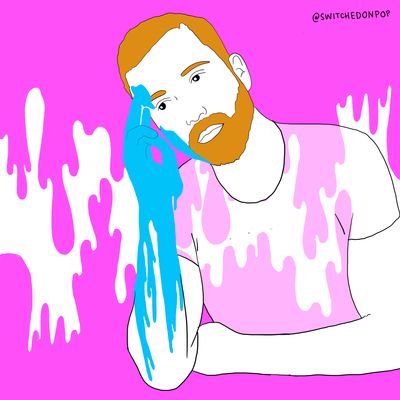
Toronto musician JP Saxe wrote the song “If the World Was Ending” with acclaimed singer-songwriter Julia Michaels in 2019 about a fictional cataclysm. Released in the Before Times of October that year, it seemed to presage lockdown; then, in the early months of the actual pandemic, the song resonated so widely that it catapulted up the charts to become a Top 40 hit. It’s now been nominated for a Grammy for Song of the Year — an award JP Saxe could share with his grandfather János Starker, who previously won Best Instrumental Solo Performance in 1997 for a recording of Bach’s cello suites. In this week’s episode of Switched on Pop, co-host Charlie Harding speaks with Saxe on both the song’s success and how he thinks about the practical implications and even morality of songwriting.
Charlie Harding: If it’s not a literal Armageddon story, what is “If the World Was Ending” about?
JP: The song is about imagining a world where your otherwise good reasons for not talking to the people you don’t talk to are no longer relevant. We wrote it in July of 2019. We were writing about a hypothetical apocalypse, almost kind of craving there being some sort of world event that would get in the way of your otherwise logical emotional reasons for keeping people out of your life. It’s two people who are together in their imaginations, in their longing nostalgic loneliness. It’s two people who are very separate, knowing that that separateness is important but needing other worldly events to circumvent all of that rationality.
I think it was relatable to a lot of people when that was a hypothetical; it was even more relatable to even more people [when the situation became] real and literal. We started getting a lot of messages on Twitter accusing us of insider information.
CH: Like conspiracy-theory, you-knew-what-was-happening-at-the-time kind of stuff?
JP: Yeah, that Julia and I had some sort of insider scoop. That was the first sign that the song was going to exist in a different light.
CH: How do you want people to listen to your work?
JP: My hope is that my songs make you think about yourself, in your own life, and not really about me. I prefer to be out of the way, not because of an insecurity or shyness but because I think art is at its best when it has you thinking about yourself, the people you love, and your own life. I’m of the belief that the more personal I can be in these songs, counterintuitively, I think the more out of the way I am.
So I guess that’s the way I want people to listen. I would hope that it has them in their own feelings less than it has them trying to dig into mine. I’ve also really tried to be adamant that this song is not in support of texting exes! [But] I take a little responsibility for all the exes texted in quarantine.
CH: The lyric “If the world was ending, you’d come over, right?” at some points feels like a statement and at other moments like a big open-ended question.
JP: To me, songs hit harder when they live in the questions, because songs have always been a mode of sorting through my emotions. If I waited to figure them out before I wrote them, they’d be really boring, preachy songs.
CH: I believe it ends on a minor chord and then just your two voices singing the final line. What was the intention there?
JP: Well, [I think] going to minor chord means uncertainty. It means questions. It means lack of resolution, all of which are very much present in this song. We don’t know if the coming over happened or not. So it felt right ending on that B-flat minor — all harmonies are gone, there’s no reverb, and [the vocal is] right up front. Singing that final question like that felt like the right feeling to end on.
CH: A lot of your songs end that way, without any sort of nice little conclusion. If you listen to “A Little Bit Yours,” “The Few Things,” “Same Room,” “Golf on TV,” all of them seem to land on uncertainty.
JP: I think there’s two reasons for that: There’s an emotional reason that I just don’t think songs are about conclusiveness. And then I think there’s a musical reason, which is that because I was brought up with jazz, hitting a big tonic [home chord] at the end of the song would have gotten me some side-eyes from jazz musicians.
CH: I also am guessing that you aren’t the kind of person that loves a film where someone walks off into the sunset.
JP: I mean, I have watched The Bachelor from time to time, so I’m not fully caught up in my own pretentiousness.
This interview has been edited and condensed for clarity.
More From This Series
- Which Artist Brought Us Christmas-Music Coal?
- The Enduring Appeal of Buckingham Nicks
- Let’s Give It Up for the Freaks

